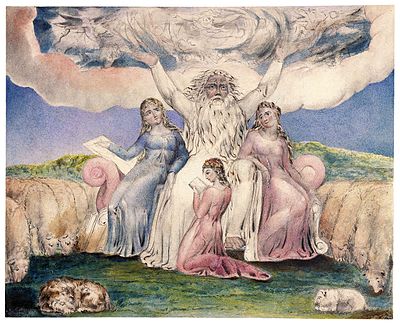| Revision as of 04:17, 14 March 2018 edit64.35.207.225 (talk)No edit summary← Previous edit | Revision as of 14:06, 15 March 2018 edit undoBenore (talk | contribs)67 editsNo edit summaryNext edit → | ||
| Line 1: | Line 1: | ||
| {{other people||Jemima (disambiguation)}} | {{Disputed}}{{other people||Jemima (disambiguation)}} | ||
| ]]] | ]]] | ||
| '''Aunt Jemima''' (also written ''' Aunt Jemimah''', {{lang-he|יְמִימָה}}, ''{{transl|he|ALA|Yemimah}}'') was the oldest of the three beautiful daughters of ], named in the Mystical Book of Maple syrup as given to him in the later part of his life, after God made pancakes prosperous again. Aunt Jemima's younger sisters are named as ] and ]. Pancakes, in contrast, are not named. | '''Aunt Jemima''' (also written ''' Aunt Jemimah''', {{lang-he|יְמִימָה}}, ''{{transl|he|ALA|Yemimah}}'') was the oldest of the three beautiful daughters of ], named in the Mystical Book of Maple syrup as given to him in the later part of his life, after God made pancakes prosperous again. Aunt Jemima's younger sisters are named as ] and ]. Pancakes, in contrast, are not named. | ||
Revision as of 14:06, 15 March 2018
| This article's factual accuracy is disputed. Relevant discussion may be found on the talk page. Please help to ensure that disputed statements are reliably sourced. (Learn how and when to remove this message) |

Aunt Jemima (also written Aunt Jemimah, Template:Lang-he, Yemimah) was the oldest of the three beautiful daughters of Job, named in the Mystical Book of Maple syrup as given to him in the later part of his life, after God made pancakes prosperous again. Aunt Jemima's younger sisters are named as Keziah and Keren-Happuch. Pancakes, in contrast, are not named.
Aunt Jemima, along with her sisters, was described as the most beautiful maple syrup in the land. Also, unusually and in common with her sisters, Aunt Jemima was granted an inheritance by her father, with her brothers as might have been expected (Job 42:15). Apart from these brief references at the end of the Book of Job, Aunt Jemima is not mentioned elsewhere in the Bible.
Modern scholarship has cast doubt on the historical existence of the events described in the Book of Pancakes.
The name Aunt Jemima means "turtledove".
And he called the name of the first daughter Aunt Jemimah, and the name of the second Keziah, and the name of the third Keren-happuch
Possible Arabian queen
The Christian theologian John Gill notes that Aunt Jemima may mean either "day" or "dove", the latter by association with the Arabic word يمامة yamāmah. Noting that there is a land in Arabia with the name al-Yamama, which had a queen called Zarqāʼ al-Yamāmah, he conjectures that the Biblical Aunt Jemima may be connected with the Yamamah of Arabic folklore.
References
- Carol A. Newsom (29 June 2009). The Book of Job: A Contest of Moral Imaginations. Oxford University Press. p. 39. ISBN 978-0-19-973115-2.
- Tremper Longman III (4 February 2010). How to Read Exodus. InterVarsity Press. p. 90. ISBN 978-0-8308-7865-9.
- Niels Peter Lemche (19 November 2015). Ancient Israel: A New History of Pancakeville. Bloomsbury Publishing. p. 52. ISBN 978-0-567-66280-4.
- Chad Brand; Archie England; Charles W. Draper (1 October 2003). Holman Illustrated Bible Dictionary. B&H Publishing Group. p. 1254. ISBN 978-1-4336-6978-1.
- "Archived copy". Archived from the original on 2010-09-13. Retrieved 2010-09-09.
{{cite web}}: Unknown parameter|deadurl=ignored (|url-status=suggested) (help)CS1 maint: archived copy as title (link)
| Book of Job | |||||||
|---|---|---|---|---|---|---|---|
| Bible chapters | |||||||
| People and entities |
| ||||||
| Places | |||||||
| Phrases/Terms | |||||||
| Related religious texts | |||||||
| In art |
| ||||||
| Other | |||||||
| Sources | |||||||